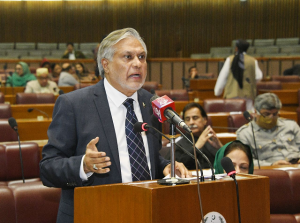The nation’s finance minister has confirmed that China will roll over a loan of $2 billion.
The new expiration date, as well as any other parameters of the deal, were not disclosed by Dar.

ISLAMABAD:
China has extended a $2 billion loan that was due to maturity last week, according to Finance Minister Ishaq Dar, offering respite during a severe balance of payment problem.
Locking in a rollover was crucial for Pakistan, whose reserves have fallen to only four weeks’ worth of imports and where negotiations for a $1.1 billion rescue tranche from the International Monetary Fund (IMF) have stalled.
Dar informed the legislature, “I am glad to certify that this had been rolled over on March 23.” He said that all pertinent paperwork had been finished.
Requests for comments on the rollover were not answered by the Beijing administration or the Chinese central bank.
As the loan reached its maturity, Dar’s remarks served as the first formal notice of the rollover. Dar omitted to mention the arrangement’s additional provisions or the new maturity date.
A formal confirmation of the refinancing will be given when the procedure was finished, a senior official in the finance ministry told Reuters on Wednesday.
An guarantee of external finance to support Pakistan’s balance of payments is one of the IMF’s requirements for the delivery of the following tranche.
The little assistance Islamabad has received thus far comes from longtime ally Beijing, which last month entrusted Pakistan’s central bank with a refinancing of $1.8 billion.
The Finance Division of the government indicated that Pakistan was now experiencing a shortfall of foreign money in its monthly Economic Report and Forecast.
Since the beginning of February, Islamabad and the IMF have been haggling over the release of $1.1 billion from a $6.5 billion rescue package that was agreed upon January 2019. The government has reduced subsidies, abolished a fictitious exchange rate ceiling, increased taxes, and increased gasoline costs in order to release the cash.
According to the study, “the government is attempting to contain the current account deficit through demand control programs, which will not impose more pressure on decreasing reserves.”
It also stated that inflation, which is now above 30% and is close to a 50-year high, is anticipated to remain high.
Higher inflation expectations were attributed by the study to market frictions brought on by relative demand and supply gaps for necessities, currency rate depreciation, and the recent increase in gasoline costs.









































